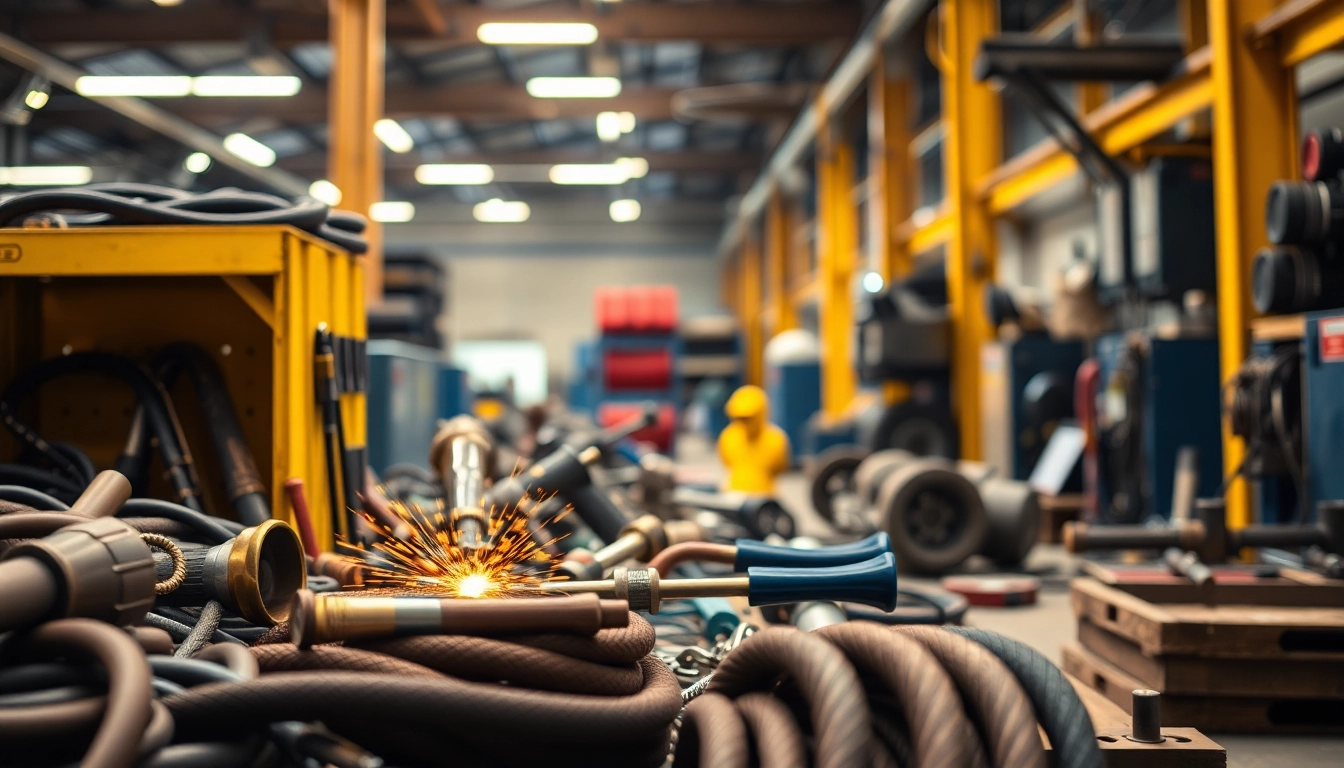Understanding Welding Supplies
Welding plays a critical role in various industries, providing strength and integrity to metal structures. Whether you are a professional welder or a hobbyist, having the right welding supplies is essential. This article explores the essential aspects of welding supplies, from the types available to where you can buy them. It provides an in-depth guide for anyone interested in enhancing their welding projects.
What Are Welding Supplies?
Welding supplies encompass a wide range of tools, materials, and accessories necessary for welding operations. These supplies are designed to assist welders in performing their jobs safely and effectively. They include not just the welding machines themselves, but also consumables like electrodes and filler materials, protective gear to ensure safety, and various accessories that enhance precision and efficiency.
Types of Welding Supplies Available
Welding supplies can be broadly categorized into several types, depending on their function and application:
- Welding Machines: These are devices used to perform the actual welding. They come in various forms including MIG welders, TIG welders, stick welders, and multiprocess welders.
- Consumables: This category includes materials such as welding rods, electrodes, and filler metals that are consumed during the welding process.
- Protective Gear: Safety is paramount in welding, and protective gear includes helmets, gloves, jackets, and footwear that shield welders from hazards.
- Welding Accessories: Accessories such as clamps, magnets, and extension cords help facilitate various welding tasks.
- Cutting and Grinding Tools: Tools used for preparing the metal surfaces for welding or finishing the welded joints.
Importance of Quality in Welding Supplies
The quality of welding supplies can significantly affect the outcome of welding projects. Low-quality tools and materials can lead to poor welds, which might compromise the integrity of the entire structure. Therefore, investing in high-quality supplies is critical for professionalism and reliability. Quality supplies often exhibit better performance, durability, and safety features that can enhance user experience.
Key Welding Supplies Everyone Should Have
Essential Tools and Equipment
Regardless of the specific welding technique, several fundamental tools are necessary across different types of welding environments:
- Welding Machine: The heart of any welding endeavor, the welding machine type will depend on the specific requirements of the project.
- Electrodes: These are essential for stick welding, providing the filler metal needed to join workpieces.
- Welding Rods: Used in various processes, these rods serve as a filler material and contribute to the overall strength of the weld.
- Welding Helmet: A critical safety item, a helmet protects the welder’s face and eyes from ultraviolet and infrared rays.
Protective Gear for Welders
Safety gear is paramount in welding. The primary types of protective gear include:
- Welding Gloves: Designed to withstand high temperatures and protect the hands from burns.
- Welding Jackets: Made from fire-resistant materials, these jackets safeguard against sparks and heat.
- Respirators: Essential for protecting the lungs from harmful fumes produced during welding processes.
- Safety Boots: Steel-toed boots offer foot protection against heavy items and accidental sharp objects.
Frequently Used Accessories in Welding
In addition to the core tools and protective gear, several accessories can enhance the welding process:
- Clamps: These help hold the workpieces securely in place during the welding process.
- Welding Magnets: They assist in positioning metal parts for accurate welding.
- Chipping Hammer: Used for cleaning welds by removing slag and other contaminants.
- Wire Brushes: Essential for cleaning welded surfaces to ensure proper adhesion of future layers.
Choosing the Right Welding Supplies for Your Project
Factors to Consider When Selecting Supplies
Selecting the proper welding supplies requires careful consideration of several factors:
- Project Requirements: Identify the specific welding tasks and techniques required. Choose supplies tailored to meet those requirements.
- Materials Being Welded: Different materials necessitate different types of welding supplies. For instance, aluminum requires different electrodes compared to steel.
- Personal Skill Level: Select equipment that aligns with your experience level to ensure safety and effectiveness.
- Budget Constraints: While quality is crucial, it is also essential to consider your budget when purchasing supplies.
Understanding Different Welding Techniques
Familiarizing yourself with various welding techniques can influence the choice of supplies. Here are some common methods:
- MIG Welding: Uses a wire electrode fed through a welding gun. Ideal for beginners and typically requires a MIG welder and shielding gas.
- TIG Welding: Provides tighter control over the deposit of weld material, great for precision work but requires more skill.
- Stick Welding: Utilizes a consumable electrode and is portable, making it adaptable to various environments.
- Flux-Cored Arc Welding (FCAW): Often used for heavy applications and involves a tubular wire filled with flux.
Common Supplies for Specific Welding Jobs
Understanding the common supplies needed for various projects can streamline your workflow:
- Sheet Metal Fabrication: Requires a MIG welder, various gauges of wire, and thinner electrodes.
- Pipe Welding: Often demands TIG or stick welding equipment, along with specific filler rods suitable for the type of piping material.
- Automotive Repairs: MIG welding is typically preferred, so wire and gas purchases should reflect this need.
Where to Buy Welding Supplies
Top Online Retailers for Welding Supplies
With a growing number of online retailers, it has become easier to find quality welding supplies. Some reputable places to consider include:
- Cyberweld: Known for a wide range of welders and accessories.
- Welder Supply Store: Offers competitive pricing on both consumables and equipment.
- WeldingOutfitter.com: Stocks tools, materials, and safety equipment from various manufacturers.
Local Stores Offering Quality Supplies
For those who prefer physical stores, many local suppliers also provide excellent options. It’s worthwhile to visit stores that specialize in welding equipment, as they often have knowledgeable staff who can help you choose the right supplies.
Wholesale Options for Bulk Purchases
If you’re involved in large projects or run a welding business, consider purchasing welding supplies in bulk. Many suppliers offer wholesale rates that can significantly reduce costs. Some wholesalers specialize in industrial-grade materials, providing an opportunity for significant savings.
Maintenance and Best Practices for Welding Supplies
Storing Your Welding Supplies Properly
Proper storage of welding supplies is essential to maintain their integrity and ensure longevity. Always store welding rods in a cool, dry place. Keep gas cylinders upright and secure to avoid tipping. Use a dedicated storage space for protective gear to prevent wear and tear.
Cleaning and Maintaining Equipment
Regular cleaning of welding equipment is critical to its performance. After each use, wipe down your welding machine and tools to remove any residue that can cause damage. Regularly inspect your hoses, cables, and connections for wear and replace them as needed.
Ensuring Longevity of Your Welding Gear
To extend the life of your welding gear, adopt best practices like avoiding overuse, following the manufacturer’s guidelines for care, and routinely checking for damage. Regular maintenance schedules can help identify potential issues before they become major problems.



